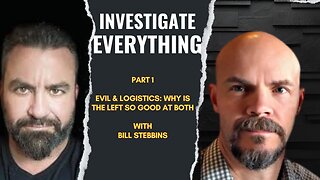Premium Only Content

Episode 3199: The Eucharist For the Worthy - Not the Unrepentant
Nightly Zoom Coordinates for Rosary:
Meeting ID: 865 8978 0399
Passcode: Wjjv4960!
Speak Lord for your Servant is Listening
Book Recommendation of the Day
"The Book of Miracles of Saint Giles" (Liber Miraculorum sancti Aegidii) — A medieval collection of miracle accounts attributed to Saint Giles, aimed at promoting his cult and drawing pilgrims
I was at one of the largest Italian Catholic Feasts in Chicago
and the procession was absolutely beautiful and the dedication to our Blessed Mother, especially the flying angels suspended in the air praying out-loud over a microphone praises to our Lady was tear jerking. But that is a tradition and it is funny to me that apart from that public display of Catholic Faith for the theme of the feast I saw a Bishop walking through the crowd and didn’t see anyone honor his office or go to kiss his bishopric ring. It was like he was almost invisible. I even said to my friends wife that people should be approaching him to kiss his ring as a symbol of a successor of the apostles. She looked at me funny and said “Kiss his ring?” as if I was suggesting something perverted. See we have not only lost the sense of the sacred but the apostolic succession and respect. Is it justified? Well based on what these Bishops are saying, doing and conducting themselves I see why it is all lost. Many no longer act as successors of the Apostles but merely … well nothing.
The Loss of Sin: A Warning to the Faithful
The Crisis We Face
A bishop, a successor of the Apostles has gone so far as to renounce the very idea of sin and declare that everyone deserves the Holy Eucharist.
This is not a slip of the tongue. This is not harmless opinion. This is a direct assault on the Catholic Faith itself.
Why? Because to deny sin is to deny repentance. To deny repentance is to deny the Cross. And to claim the Eucharist is owed to all is to trample the very Body of Christ underfoot.
But the truth of the Church remains unshaken. Two pillars stand:
1. Sin is real and it separates us from God.
2. The Eucharist is Christ Himself and must only be received worthily.
We will unmask the lie, calls out the danger, and reminds the faithful of their duty in the face of betrayal.
The Reality of Sin
The modern world chants: “Don’t judge.” Psychologists soothe: “It’s all relative.” And now even bishops echo: “Sin is outdated.”
But God’s Word thunders otherwise. St. Paul in Romans 3:23 declares: “All have sinned, and fall short of the glory of God.” Christ warns in Luke 13:3: “Unless you repent, you will all likewise perish.”
Repentance presumes sin. No sin? No repentance. No repentance? No salvation.
Pope Pius XII saw this storm rising when he said: “The sin of the century is the loss of the sense of sin.” Look around what was once condemned is now paraded. What was once shameful is now pride. And when a bishop denies sin, he simply baptizes the rebellion of the world.
But ask yourself: if there is no sin… why the Cross? Why the Blood? Why Baptism? Why Confession?
To deny sin is not confusion it is blasphemy.
The Eucharist For the Worthy, Not the Unrepentant
“No one deserves the Eucharist.” Let that be clear.
The Eucharist is not a right. It is not a membership benefit. It is the living God made flesh for us a pure gift of grace.
The Catechism of Trent commands: the Eucharist is for those in the state of grace. St. Paul warns in 1 Corinthians 11:27 that whoever eats unworthily is guilty of the Body and Blood of the Lord. He does not say unworthy reception is harmless he says it is damnation.
The early Church guarded the altar fiercely. St. Justin Martyr wrote that no one may receive unless baptized, confessed, and living according to Christ’s commands.
Yet today, we are told it’s “for everyone.” As if the Eucharist were a government program. As if Christ Himself were obligated.
But angels veil their faces before the Eucharist! And bishops dare say, “It belongs to all”?
The Eucharist received unworthily is no longer fire of love it is fire of judgment.
False Mercy: Indifferentism and Modernism
Where does this poison come from?
It is the fruit of indifferentism: “All paths lead to God.”
It is the fruit of modernism: “Truth changes with the times.”
Both condemned. Both deadly. Pope St. Pius X called modernism “the synthesis of all heresies.”
When a bishop preaches, “There is no sin, all may receive,” he preaches man, not Christ. He builds a counterfeit church of tolerance, not the Church of Calvary.
And he wraps it all in the word mercy.
But true mercy does not say, “Stay in your sin.” True mercy says, “Go, and sin no more.”
To tell a sinner, “It doesn’t matter” that is not mercy. That is spiritual cruelty.
The Duty of the Faithful
So what do we do when even shepherds betray?
We look to history. In the 4th century, nearly the entire Church collapsed into Arian heresy. Bishops denied Christ’s divinity. And yet, St. Athanasius stood. Exiled. Hated. Defamed. But faithful.
He declared: “Even if Catholics faithful to Tradition are reduced to a handful, they are the true Church.”
In our own time, Archbishop Lefebvre carried the same torch, refusing to bow to modernist Rome that sought to dissolve the Faith.
So too must we:
• Study the Catechism so we cannot be deceived.
• Cling to Tradition which does not change.
• Seek the Holy Mass where reverence, truth, and fidelity remain.
Our allegiance is not to men. It is to Christ the King.
Reparation for Eucharistic Sacrilege
But it is not enough to resist we must also repair.
Every unworthy Communion, every abuse of the Sacrament, wounds Christ again. The Sacred Heart bleeds a new.
At Fatima, Our Lady pleaded: “Make reparation for the outrages committed against the Most Holy Sacrament.”
So what can we do?
• Pray the Rosary daily.
• Make Holy Hours of reparation.
• Teach our families the truth of the Real Presence.
• Offer sacrifices to console the Heart of Jesus.
These acts may look small but before God, they are mighty weapons.
Conclusion
The denial of sin. The profanation of the Eucharist. These are not acts of mercy. They are acts of betrayal.
But Christ remains. His truth does not shift. His Sacraments remain holy. His warnings are still clear.
So let us resolve:
• To live always in the state of grace.
• To approach the altar with fear, trembling, and joy.
• To remain the faithful remnant, clinging to Christ when others fall away.
Because in the end, it is not numbers, not appearances, not titles that matter. It is fidelity. And fidelity to Christ alone.
Blessed Detachment and Apostolic Reward: St. Giles and the Twelve Martyrs”
Introduction
Praised be Jesus Christ! Today is Monday, September 1st, 2025, in the cycle of the 12th Sunday after Pentecost, and the Church celebrates the Feast of St. Giles, Abbot, and the memory of the Twelve Holy Brothers, martyrs for the faith.
The liturgy today places before us two complementary lessons: the Epistle from Ecclesiasticus reminds us that true happiness and blessedness come from a clean conscience and detachment from sin, while the Gospel from St. Matthew calls us to radical sacrifice for Christ, promising eternal reward to those who leave everything for His sake. Both readings are lived powerfully in the lives of today’s saints—St. Giles in his ascetic purity, and the Twelve Holy Brothers in their martyrdom.
________________________________________
Epistle – Ecclesiasticus 14:1–6
"Blessed is the man that hath not slipped by a word out of his mouth, and is not pricked with the remorse of sin. Blessed is he whose soul doth not condemn him, and who is not fallen from his hope. Riches are not comely for a covetous man and a niggard, and what should an envious man do with gold? He that gathereth together by wronging his own soul, gathereth for others: for another will squander away his goods in rioting. He that is evil to himself, to whom will he be good? and he shall not take pleasure in his goods."
Reflection on the Epistle
The inspired text reveals the secret of blessedness: a clean conscience, freedom from sin, and detachment from greed. The man who hoards wealth, cheats others, or clings to earthly goods finds no peace; his possessions ultimately pass to another, and his soul is left impoverished.
This is a radical rebuke to the modern world, which equates happiness with possessions and consumption. Yet Ecclesiasticus reminds us that holiness, not wealth, brings peace. True blessedness is found in fearing God, speaking truth, and living with simplicity.
St. Giles lived this teaching profoundly. As a hermit, he abandoned worldly goods to embrace prayer, penance, and solitude with God. His detachment freed him to live in joy and purity. Likewise, the Twelve Holy Brothers let go of life itself, embracing martyrdom rather than deny Christ.
Gospel – Matthew 19:27–29
"Then Peter answering, said to him: Behold we have left all things, and have followed thee: what therefore shall we have? And Jesus said to them: Amen I say to you, that you, who have followed me, in the regeneration, when the Son of man shall sit on the seat of his majesty, you also shall sit on twelve seats judging the twelve tribes of Israel. And everyone that hath left house, or brethren, or sisters, or father, or mother, or wife, or children, or lands for my name’s sake, shall receive an hundredfold, and shall possess life everlasting."
Reflection on the Gospel
St. Peter voices the question of every disciple: what reward is there for following Christ and leaving everything behind? Our Lord’s answer is twofold:
1. The Apostles will share in His authority, judging the twelve tribes of Israel.
2. Every disciple who renounces earthly attachments for Christ will receive a hundredfold in this life and eternal life in the next.
This Gospel makes clear that discipleship requires sacrifice, but never without reward. To leave house, family, and possessions for Christ is not loss, but gain. Christ Himself becomes our treasure, and eternal life our crown.
The saints lived this truth:
• St. Giles left the world for Christ, gaining spiritual riches.
• The Twelve Holy Brothers surrendered even their lives, receiving eternal glory.
• The Apostles themselves, whose lives we follow in the liturgical cycle, left everything to follow Christ and now reign with Him in glory.
Feast of St. Giles and the Twelve Holy Brothers
• St. Giles (7th century) was a hermit in southern France, renowned for holiness, humility, and miracles. He became the patron of the poor, the crippled, and those seeking purity of life. His detachment from worldly goods made him rich in grace.
• The Twelve Holy Brothers were Roman martyrs of the 4th century, who suffered under Diocletian’s persecution. They bore witness that fidelity to Christ is worth more than life itself.
Their lives are the living commentary on today’s Scriptures: blessedness in detachment, and eternal reward for sacrifice.
Application for Today
• Examine your heart: Do you live with a clean conscience, or are you entangled in greed and sin?
• Practice detachment: Use material goods for God’s glory and the service of others, but cling to nothing as if it were your salvation.
• Embrace sacrifice: Do not fear leaving behind comfort, convenience, or even relationships when they conflict with fidelity to Christ.
• Imitate the saints: Like St. Giles, embrace purity and humility; like the Twelve Holy Brothers, be ready to suffer all for the Name of Jesus.
Conclusionary Prayer
O Lord, who hast promised eternal life to those who leave all things for Thy sake, grant us the grace to live detached from the world and attached only to Thee. Through the intercession of St. Giles and the Twelve Holy Brothers, may we persevere in purity, humility, and fidelity until the end. Strengthen us in sacrifice, that we may one day receive the hundredfold reward of everlasting life.
St. Giles, pray for us.
Holy Martyrs, pray for us.
Sacred Heart of Jesus, have mercy on us.
Immaculate Heart of Mary, intercede for us.
-
 LIVE
LIVE
LFA TV
14 hours agoBREAKING NEWS ALL DAY! | THURSDAY 9/25/25
12,618 watching -
 LIVE
LIVE
Game On!
19 hours agoThursday Night Football SHOWDOWN! Seahawks vs Cardinals Divisional CLASH!
3,698 watching -
 28:53
28:53
Clownfish TV
22 hours agoYouTube ADMITS They CENSORED Conservatives! What Else is Google Hiding?! | Clownfish TV
32.3K32 -
 40:15
40:15
NAG Daily
14 hours agoThe Rezendes Rundown Ep. 19 - Mad Bad Science
3.29K2 -
 31:57
31:57
Uncommon Sense In Current Times
17 hours ago $0.35 earnedThe DEI Housing Hoax | Dan Huff on Zoning, Manufactured Crisis & the War on Suburbs
10.4K1 -
 2:55
2:55
From Zero → Viral with AI
1 day ago $0.18 earnedAI Misconceptions: Why Small Businesses Hold the Real Advantage 🚀
3.08K -
 LIVE
LIVE
BEK TV
23 hours agoTrent Loos in the Morning - 9/25/2025
238 watching -
 2:39
2:39
The Official Steve Harvey
1 day ago $0.28 earnedThese books didn’t just change my mind, they changed my life. 📚💯
4.23K -
 1:35:35
1:35:35
Investigate Everything w/ Brian O'Shea
14 hours agoPart 1: "Evil & Logistics: Why is the Left So Good At Both” w/ Brian O’Shea & Bill Stebbins
8.1K1 -
 1:20:31
1:20:31
CharLee Simons presents DO NOT TALK
1 day agoR.I.P. MEDIA FREAKS
5.38K1